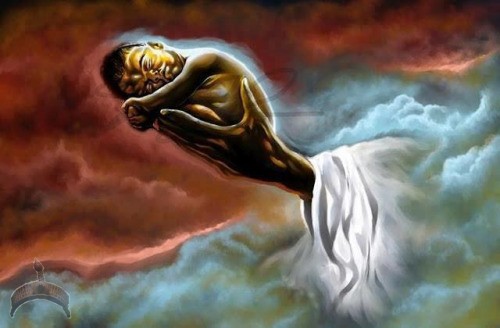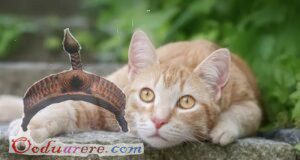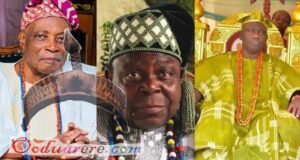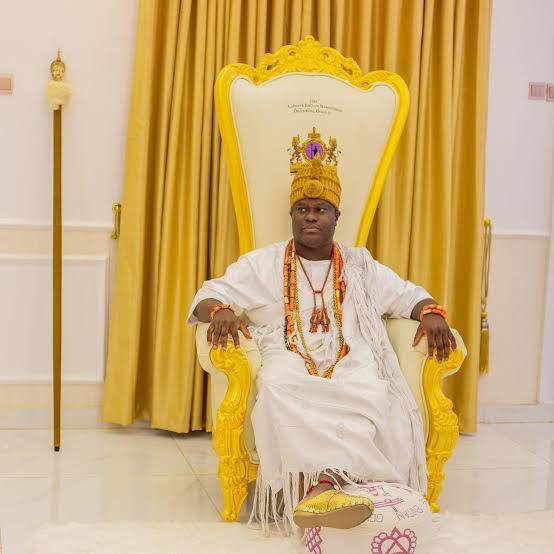Let’s get something straight: Olódùmarè is not “God” — and trying to make that equation is not only inaccurate, it’s lazy. The attempt to force Yoruba cosmology into the mold of Western or Abrahamic religious concepts is exactly how culture gets erased.
Let’s start with the word “God.” It’s not some ancient, divine label handed down by the heavens. The English word God is a derivative term, believed to come from the Proto-Germanic gudan, itself related to the Proto-Indo-European root ǵʰu-tó-, meaning “that which is invoked” — often in the context of pouring libation or making a sacrifice.
Here is the first version of Olódùmarè written by the late legendary Prof. Sophie Oluwole – The True meaning of Olódùmarè (Olodumare)
In early usage, it referred to any powerful, invoked entity, not a singular supreme being. That’s right: the word God originated from a verb — to call upon, to pour to. It was never a title for the Source of all things. Over centuries, shaped by Roman, Greek, and later Christian theology, “God” evolved into the singular, all-powerful figure we now see in religious texts — usually male, usually jealous, and usually portrayed in human terms.
In short, “God” is a deified being. A powerful one, yes — but still part of a pantheon in many cultures. In fact, conceptually, “God” is closer to Sàngó, Ọya, Ògún, and other Òrìṣà — divine entities with form, personality, worship, and story — than to Olódùmarè, who has none of those attributes.
Now let’s talk about Olódùmarè — and get the meaning right:
Oló / Olú – Owner, Source
Odù – Sacred code, divine mystery
Mọ̀ – To know Àrè – Vastness, boundlessness, infinity
So Olódùmarè translates as:
“The Owner and Knower of the Sacred Mystery of Infinite Vastness.”
That’s not a name. That’s a description — a cosmological map embedded in language. Our ancestors weren’t naming a character; they were describing a force too vast to be named, too complex to be idolized. Olódùmarè is not prayed to for favor. Olódùmarè is aligned with right living (ìwà pẹ̀lú Ọ̀rún), balance, and harmony with creation.
Meanwhile, the Christian “God” (and yes, I was sarcastically asked if “God” is a noun — of course it is; it’s literally named) is a gendered, emotional being. He kills, blesses, chooses sides, punishes, regrets, and demands exclusive worship. Even the Bible says, “Let us make man in our own image” — implying multiplicity and shared divine agency. That is already foreign to the concept of Olódùmarè.
Let’s be clearer still:
“God” is gendered (“He”/“Father”/“Lord”)
“God” has a name and a personality
“God” is worshipped, invoked, pleased, and angered
Olódùmarè?
No gender
No face
No temple
No priesthood
No flattery rituals
And that’s by design.
The Òrìṣà — like Sàngó, Ọya, Èṣù, Ọbàtálá — are divine forces that interface with human experience. They are not the Supreme. They know this. They say this. They are expressions of the cosmos, not the Source of it.
So to reduce Olódùmarè to the label “God” is not only inaccurate — it’s disrespectful. It tries to cram an indigenous, complex, non-linear worldview into a colonial, doctrinal, linear framework.
God ≠ Olódùmarè
God = A deified being
Olódùmarè = The infinite, unknowable cosmic force, encoded in language, not named
You can engage with the God concept if that’s your path. No hate. But don’t flatten my language or insult my ancestors by equating their deepest metaphysical insight to a character from someone else’s scripture.
Because, as we say:
Èdè ènìyàn ní ìdánimọ̀ ènìyàn
Your language is your identity.
And my language never called Olódùmarè “God.” Yours might. Mine knew better.
by Akinkanju Valor
 Ọmọ Oòduà Naija Gist | News From Nigeria | Entertainment gist Nigeria|Networking|News.. Visit for Nigeria breaking news , Nigerian Movies , Naija music , Jobs In Nigeria , Naija News , Nollywood, Gist and more
Ọmọ Oòduà Naija Gist | News From Nigeria | Entertainment gist Nigeria|Networking|News.. Visit for Nigeria breaking news , Nigerian Movies , Naija music , Jobs In Nigeria , Naija News , Nollywood, Gist and more









